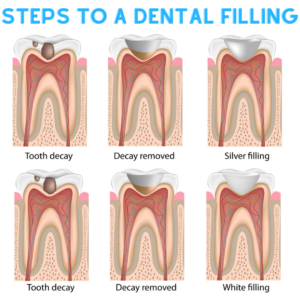So you’re missing a tooth, and are ready to do something about it. You head to Google to research your options and will most likely see information about Dental Implants pop up immediately. You do the research and start to wonder, what is it really like? This blog post will outline what to expect when getting dental implants at Dental Made Easy.
What to Expect
This isn’t a surgery where you go into the operating room with missing teeth and come out with new pearly whites. This surgery requires outpatient care and is performed in several stages over time.
If the damaged or injured tooth is still in your mouth, your dentist will have to remove it. This will require anesthesia and is essentially its own procedure.
Most people do not need this step but in some cases you may need a bone graft, meaning the surgeon removes a small amount of bone from elsewhere in your body and surgically embeds it into your jawbone. This is only necessary if your jaw does not have sufficient bone to support implants.
If you received a bone graft then you will need some time to heal, but if not then the dentist will place the metal dental implant in your jaw. The metal dental implant is screwed into the bone to provide the most possible strength. Then after this, you will go through another healing phase that could last several months.
After you’ve fully healed, the surgeon will attach the abutment to the implant. After the soft tissue heals from that, the dentist will make a mold of your teeth and jawbone. At a later time, they will finally place the artificial tooth (the dental crown) on top of the abutment.
Dental Implant Procedure Stages And Timeline
The very first thing you will need to do is meet with your Dental Made Easy dentist for an initial consultation. During this appointment, they will do a comprehensive dental exam, take an X-ray of your mouth, and then take impressions of your teeth.
After this, your dentist will talk with you about the recommended treatment plan, go over the steps of the procedure, set the time frame for everything, and tell you what to do during recovery. You may also discuss whether or not you need a bone graft.
During this consultation,which is free at Dental Made Easy until the end of March, you’ll schedule the first stage of the procedure.
Bone Grafting
If you need a bone graft, it can take 4-12 months before your jaw is ready for an implant. This time is needed for your bone to heal properly.
Implant Placement
Next, you’ll be ready for getting the implant, which is the metal screw that goes into your bone and acts as the anchor for the whole prosthesis. This procedure can take 1-2 hours and is painless thanks to anesthesia.
After you’ve had the implant placed in your jawbone, the healing process can take up to five months for the lower jaw and up to seven months for the upper jaw. Once your mouth is healed, you’ll be ready for the next stage.
Placing The Temporary Crown
After the implants have fused with your jawbone, you’re ready for the next stage. You will need to get a healing cap and possibly a temporary crown.
The dentist will place the healing cap on the head of the implant which helps guide the gum tissue in the proper way to heal. A healing cap is a round piece of metal that keeps the gums away from the implant. This collar will stay on for 10-14 days.
After this time, in which your tissue should have healed, the dentist will remove it and move onto the next step.
Placing The Abutment
Next comes the abutment, which is the part that screws into the implant and will support the crown. After the abutment is placed, your dentist will take another impression of the abutment for each replacement tooth.
Then you’ll get a temporary crown while your tissues continue to heal and form around the artificial tooth as with your natural teeth. You will wear the temporary crown for four to six weeks. During this time, your permanent crown will be made.
Placing The Permanent Crown
The placing of the permanent crown is the last stage of the procedure. Crowns are the tooth-looking part of the implant and can either be screwed into the abutment or cemented in place. The latter option typically looks better and more natural as there is no screw hole, which can be visible at certain angles. As far as crowns go, there are two main types you and your dentist can choose:
1. Removable Crown
Removable artificial teeth are white with pink plastic material to simulate a natural tooth and the surrounding gum tissue. It is typically mounted on a metal frame, which snaps into the abutment. This means you can remove it for daily cleaning.
2. Fixed Crown
With a fixed crown, the artificial tooth either screws into the abutment or is cemented on, and this is permanent. You will not be able to remove a fixed crown for cleaning. Most of the time, this type of crown is much stronger and stable than a removable crown.
Your Dental Health
When it comes to your health, trust in the dentists at Dental Made Easy. Dental Made Easy has the best dental practices in New York City and we are open on Sundays as well as late evenings. All of our dental offices are opened and accepting new patients at this time. We are rated among the top dental practices in New York, NY with numerous 5 star reviews on Google, Yelp and Facebook. For a teeth cleaning or exam, we recommend calling or booking an appointment online with one of our talented dental professionals. All new patients may also take advantage of our $149 Cleaning Special that includes an exam and x-rays or our Free Dental Implant Consultation Special.
To set up your appointment give us a call at (844) 979-EASY (3279). We have offices in Forest Hills, Queens, Little Caribbean, Brooklyn and Garden City, Long Island. Walk-ins welcomed, we take emergencies and we are open on late nights to accommodate patients with a busy schedule. We hope to see you soon!









